
Cambridge is a city and non-metropolitan district in the county of Cambridgeshire, England. It is the county town of Cambridgeshire and is located on the River Cam, 55 miles (89 km) north of London. As of the 2021 United Kingdom census, the population of the City of Cambridge was 145,700; the population of the wider built-up area was 181,137. Cambridge became an important trading centre during the Roman and Viking ages, and there is archaeological evidence of settlement in the area as early as the Bronze Age. The first town charters were granted in the 12th century, although modern city status was not officially conferred until 1951.

St Ives is a medieval market town and civil parish in the Huntingdonshire district in Cambridgeshire, England, 5 miles (8 km) east of Huntingdon and 12 miles (19 km) north-west of Cambridge. St Ives is historically in the county of Huntingdonshire.

Elephant and Castle is an area of South London, England, in the London Borough of Southwark. The name also informally refers to much of Walworth and Newington, due to the proximity of the London Underground station of the same name. The name is derived from a local coaching inn.
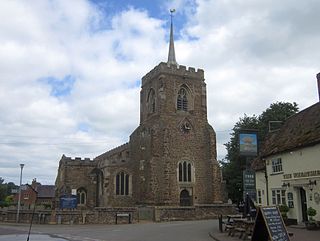
Gamlingay is a village and civil parish in the South Cambridgeshire district of Cambridgeshire, England about 14 miles (23 km) west southwest of Cambridge.

The Angel, Islington, is a historic landmark and a series of buildings that have stood on the corner of Islington High Street and Pentonville Road in Islington, London, England. The land originally belonged to the Clerkenwell Priory and has had various properties built on it since the 16th century. An inn on the site was called the "Angel Inn" by 1614, and the crossing became generally known as "the Angel". The site was bisected by the New Road, which opened in 1756, and properties on the site have been rebuilt several times up to the 20th century. The corner site gave its name to Angel tube station, opened in 1901, and the surrounding Angel area of London.

Bar Hill is a purpose-built village with a population of 4,000 about 4 miles (7 km) northwest of Cambridge, England on the A14 road, just east of the Prime Meridian.

Grantchester Meadows is an open space in Grantchester, to the south of the city of Cambridge, England. It is part of the broad green flood plain from the pubs in Grantchester to the Ditton Plough, comprising Grantchester Meadows, The Lammas Land, the Backs, Jesus Green, Midsummer Common, and Stourbridge Common.

Hills Road Sixth Form College is a public sector co-educational sixth form college in Cambridge, England, providing full-time A-level courses for approximately 2400 sixth form students from the surrounding area and a variety of courses to around 4,000 part-time students of all ages in the adult education programme, held as daytime and evening classes.
Holywell is a village in Cambridgeshire, England, approximately 6 miles (10 km) east of Huntingdon, in the civil parish of Holywell-cum-Needingworth. It is situated within Huntingdonshire, a non-metropolitan district of Cambridgeshire, and is a historic county of England.
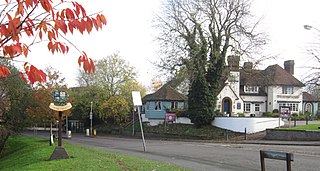
Cherry Hinton is a suburban area of the city of Cambridge, in the Cambridge district, in the county of Cambridgeshire, England. It is around 3 miles (4.8 km) southeast of the Cambridge city centre.

Rogate is a village and civil parish in the Chichester district of West Sussex, England, in the Western Rother valley. The village is on the A272 road 5.6 miles (9.0 km) west of Midhurst and 5 miles (8.0 km) east of Petersfield, Hampshire. The civil parish includes the villages of Rogate and Rake and the hamlets of Haben, Fyning, Hill Brow, Langley, Durford, Wenham, Durleighmarsh and Terwick Common.

Middleton is a village and civil parish in the English county of Norfolk. It covers an area of 5.02 sq mi (13.0 km2) and had a population of 1,516 in 621 households at the 2001 census, reducing to 1,450 at the 2011 Census.

Grove Hill is an area of the Middlesbrough's Longlands and Beechwood ward in the Borough of Middlesbrough, North Yorkshire, England. It is a historic part of the North Riding of Yorkshire. The area's main shopping area is off Marton Road at the junction with Marton Burn Road and Belle Vue.

The Cambridgeshire High School for Boys was founded as the Cambridge and County School for Boys in Cambridge, England, in 1900.
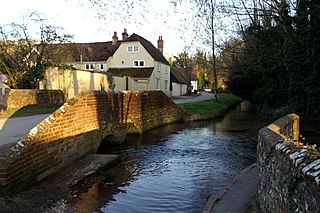
Warnford is a village and civil parish in the City of Winchester district of Hampshire, England. The parish covers 1283 hectares. The village lies on the A32 in the upper valley of the River Meon between West Meon and Exton. The population in 2019 was estimated at 220. The village is rural in character, with most of the buildings along River Lane, Lippen Lane and Hayden Lane.
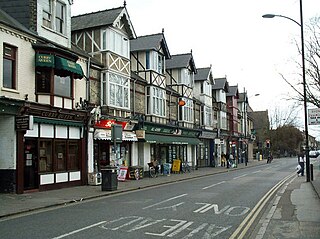
Mill Road is a two-lane road in southeast Cambridge, England. It runs southeast from near to Parker's Piece, at the junction with Gonville Place, East Road, and Parkside. It crosses the main railway line and links to the city's ring road. It passes through the wards of Petersfield and Romsey, which are divided by the railway line. It is a busy road containing many independent businesses, churches, hospital and Cambridge Central Mosque.

The Ram Jam Inn was a historic pub in the civil parish of Greetham, Rutland, England, located on the west side of the Great North Road, near Stretton, about 7 miles north of Stamford. It was frequented by the highwayman Dick Turpin in the 18th century, and it is claimed that one of his confidence tricks inspired the pub's name. The pub closed in 2013, and plans to demolish it were put on hold: it was finally demolished in the early 2020s.

Two St Peter's Square is a high-rise office building in St. Peter's Square, Manchester, England. Designed by SimpsonHaugh and Partners, the scheme was controversial as it involved the demolition of a 1930s Art Deco but unlisted building.
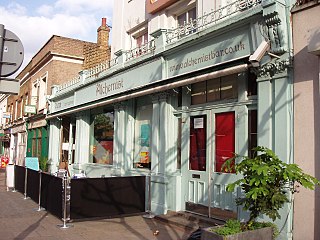
The Alchemist is a former pub at 225 St John's Hill, Battersea, London, that was controversially demolished in May 2015 after over 100 years in business.
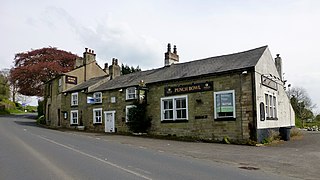
The Punch Bowl Inn was an 18th-century Grade II-listed public house in Hurst Green, Ribble Valley, Lancashire, England. It consisted of a number of independent buildings, including what were originally two cottages and a barn, and a 19th-century extension. The pub was reputed to be haunted by the ghost of a highwayman. The pub closed in 2012 and afterwards stood empty. It was demolished in June 2021 without the required planning permission and an investigation followed, leading Ribble Valley Council to instruct the owners to rebuild it.




















